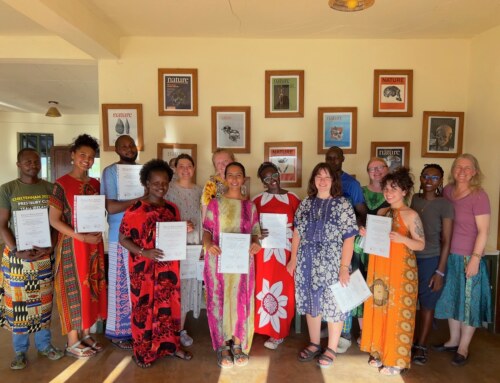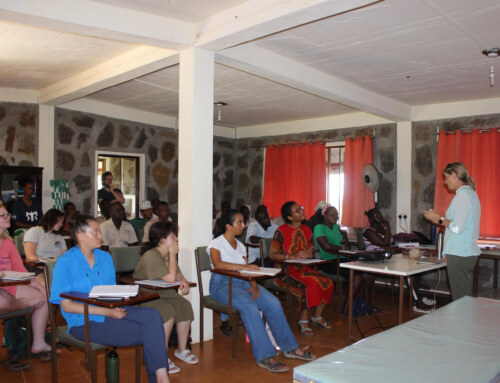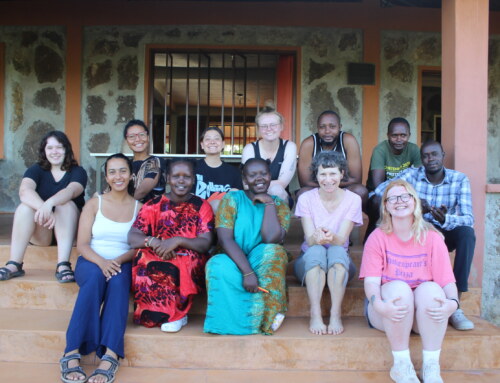Paivaa/hello!
Welcome to another installment of TBI’s field school blog! This weeks blog post is written by me, Onni Purhonen.

I’m a biology student from the University of Helsinki in Finland, currently in my second year of studies and specializing in ecology and evolutionary biology. The current field school-module on ecology with Dr. Dino J. Martins has therefore been an exciting time for me!
We bid farewell to the wonderful Mpala research center on Sunday, after what felt like a long but exhilarating week of academic adventures. On our very last drive in Mpala, from the research center to the airstrip, we had some amazing luck and saw two young lions! A sight many of us had been desperate to see, and already anguished that we might miss it altogether. Such amazing luck!

Arriving in Turkana on TBI’s plane.
From Mpala we travelled by TBI’s own plane northward to the arid Turkana county. The ride was a bit bumpy, but we felt like we were in safe hands with our Captain Charles. Upon arrival in Turkana, the first thing that hit me was the heat. With day temperatures rising to a soaring +37 degrees Celsius, and the sun blazing down on us constantly, this climate certainly was different to what we encountered at Mpala. Everyone none the less arrived in good spirits at TBI’s Turkwel research station, and we were greeted by a welcoming staff and a very excited little puppy called Mio!

Mio, TBI’s resident puppy!
After a calm evening and night of settling in, everyone felt ready to continue the ecology module in this new environment. I feel confident in saying that we all learned two valuable lessons during this first day. Firstly, the collection of ecological data through sampling, especially when doing this on plants such as the oppressively invasive Prosopis, is time-consuming and thorny work. Secondly, in the desert one consumes far more water than one would expect! I ended up drinking around 8 liters of water the first day, and I never felt as if I had to chug it with force! Such are the conditions here. The day was however both informative and fun, and despite fears of the harsh Turkana climate I felt confident that nine weeks here won’t prove an issue.

The data collected by the students on the pod- and overall size of the Prosopis plant are part of a long-term study on its spread around the area, and capability to outcompete local flora
The next day we continued learning about the multiple infectious diseases spread by vectors in Kenya and neighboring countries. The parasites causing these diseases are often persistent little creatures, and we learned both about the successes and challenges in eradicating such pestilences.
Wednesday was a big day. We left early by car in order to make the long ride to the shores of Lake Turkana… from where we would catch a pair of boats to the magnificent Central Island! This is a protected, uninhabited island in the middle of the vast, jade-colored waters of the lake, with rich fauna and flora. In order to get there we drove over with some of the local fishermen. The waters of the lake could not be described as entirely peaceful, but everyone made it to the island safe and sound.

Divided into two boats, it was a pleasant experience for everyone to feel the brisk wind in our faces!
Central Island is also special because of its geographical features: the island, itself situated in a lake, has three lakes in itself! We saw two of these: the smaller, intensively alkaline Flamingo lake (named for the flamingoes often feeding there, of which we unfortunately saw none), and the larger, aptly named Crocodile lake. In contrast to the dangerous waters of Flamingo lake, Crocodile lake provides a breeding ground for fish, birds and, obviously, Nile crocodiles (making the waters there perilous for an altogether different reason). We saw some of these magnificent creatures whilst trekking up a cliff called “the baboon’s head” – but fortunately from afar. The whole adventure was amazing – the views, crocodiles and beautiful waters of both Lake Turkana and the smaller lakes on the island. We could not stay for too long however, as both the boat ride and the drive from the lake back to Turkwell take their time. The temperature was also intense, even by Turkana standards, so sitting back down into the boats was equal parts saddening and relieving.

Crocodile Lake, one of the 3 crater lakes on Central Island.
As Dr. Martins had to leave for Nairobi on Thursday, we were left in the capable hands of Acacia, the Technical Manager at Turkwel, and Medina. We acquainted ourselves with the impressively self-sufficient, hydroponic food-production system at Turkwel, as well as visited the village right by the station. Here we got to learn about the traditional way of life for the Turkana pastoralists and got to meet some of the village inhabitants as well. We even had the privilege of being invited to one of the Manyattas (small houses part of a larger homestead, or Boma). The Manyatta was ingeniously crafted from parts of a doum-palm tree. The interior was surprisingly cool, and provided excellent refuge from the hot midday sun!

Michael Kiptumba, the farm manager at Turkwel showing us the amazing fruits and vegetables growing in desert conditions.

A manyatta we were kindly invited into.
Friday and Saturday were spent wrapping up the ecology module: we had our final lectures with Dr. Martins (on freshwater ecosystems – very interesting!), and everyone was quite busy writing their research papers, the final works for the course. We also had a small, final exam on Saturday, which everyone managed stellarly! The module as a whole has been a joyride from start to finish, with sometimes long days but always good company and absolutely fascinating experiences. As a student I have enjoyed both the lectures and the practical fieldwork immensely, and want to extend my thanks to Dr. Martins as well as all other lecturers who have contributed in making this a both valuable and memorable course! On Monday a new module starts, and new adventures with geology await us!

The Turkwel River is full of interesting critters, and the cool water makes a nice break from the heat!
P.s: despite mentioning the heat of Turkana multiple times during the text, the environment here is breathtakingly beautiful and unique. And after spending a week here I can confirm that the temperature is something one very well gets used to!





